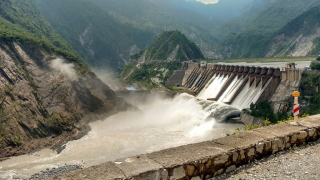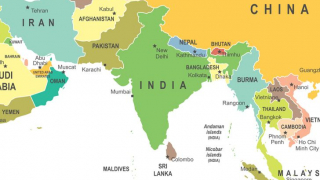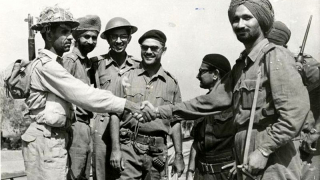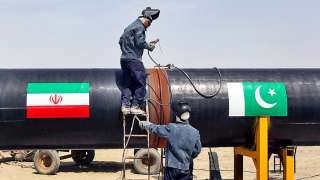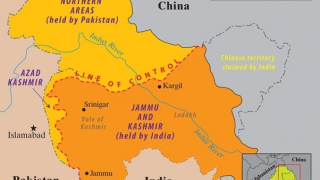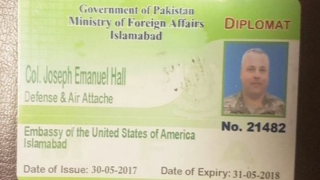Has the battle between Pakistan & Qatar for influence in Afghanistan really begun?
Since the foreign troops withdrawal from Afghanistan, a great power vacuum was created in the country which resulted in the Afghan Taliban taking control of Kabul on August 15, leaving multiple regional and extra-regional stakeholders fighting for influence in the war torn country.
In the wake of the Taliban takeover, a great amount of literature have started to surface which either deliberately discredits and undermines the Taliban, absolve the foreign occupying forces from their atrocities and responsibilities or concoct scenarios and connect dots which are not even there in the first place.
One such concoction was discovered in Baktash Siawash's opinion article for The National Interest in which he tried to explain how another strategic & political game is about to unfold between Pakistan and Qatar over influence in Afghanistan, especially over the Afghan Taliban. His arguments were over-simplistic, subjective and cursory to say the least.
It is suggested to first go through Mr. Siawash's piece before proceeding with this one for readers' better understanding.
It is without a doubt that after August 31, the political and security landscape of Afghanistan changed substantially and Qatar has also been involved in Afghanistan's political landscape for quite some time now. It's involvement got more consolidated after it began hosting the Taliban political office since 2013.
During the US & allied forces withdrawal from Afghanistan, Qatar did play the role of one of the most significant transit hubs for Afghans and international evacuees from Afghanistan. Qatar’s foreign minister was also one of the few high-level political foreign dignitary to visit Afghanistan since the Taliban takeover.
Be that as it may, these developments albeit significant came secondary to similar initiatives taken by Pakistan.
Comparing Pakistan's influence and pull in Afghanistan with that of Qatar's is an intriguing concept but far-fetched.
Pakistan's role will always be more significant in Afghanistan as compared to Qatar because fortunately or unfortunately, the former has more vested interests in Afghanistan for several obvious reasons as compared to the latter. The geographical proximity, cultural & linguistic homogeneity, combined with almost similar weltanschauungs will always give Pakistan a competitive advantage over Qatar. Pakistan is bound by natural necessity to be a stakeholder in Afghanistan where any sort of situation in the latter is bound to have an impact on the former.
Whereas Qatar's involvement in Afghanistan is purely for political reasons only where it seems that it's political leadership thought it necessary to use situation in Afghanistan as a golden opportunity to get its country more aligned with US interests in the region and introduce itself as a major power broker in the Middle East amidst Qatar's recent regional competition with other Middle Eastern powers such as Saudi Arabia, UAE & Kuwait.
This also has to do with Qatar's bonhomie with Iran and Turkey and their increased and reinvigorated interests in Afghanistan, post foreign troops withdrawal.
Coming back to the alleged Pakistan-Qatar competition, what gives Pakistan an added advantage in Afghanistan is the its will to get practically involved in Afghanistan besides extending political, economic, and moral support to the country.
Qatar on the other hand will never get practically involved in Afghanistan. This might not be due to lack of political will but due to Qatar's strategic and military incapacity to do so despite its great economic prowess. Money can't buy everything. There are ways where Qatar can work around this & utilize its financial wherewithal to "hire" the particular help in order to get practically involved in Afghanistan but for how long? And to be fair, the risk outweigh the benefit manifolds.
Nevertheless, this doesn't mean that Qatar will not get involved in Afghanistan but terming it a "battle for influence" with Pakistan is an over-exaggeration.
Of course there's going to be back and forth between different regional and extra regional states in Afghanistan for various vested interests. Unfortunately, this has been one of Afghanistan's biggest problems. Many states have numerous stakes in Afghanistan. That is why peace has been an illusionary concept for the country for several decades.
The only difference now is that besides the major powers' great game in Afghanistan, the country will now experience manifestation of strategic & political games that will be played by several regional powers/players.
Speculations that Qatar might get more influence over the Afghan Taliban due to internal rifts in the group & Mullah Ghani Baradar, being more politically inclined towards Qatar are also a far cry from reality.
Regardless of how things seem at the moment or what the Taliban are saying, there's more than what meets the eye. Mullah Baradar was Mullah Omar's (Taliban Supremo) closet comrade who co-founded the Taliban with Omar during the 1990s. Baradar also later became Omar's brother-in-law & is uncle to Mullah Yaqoob, IEA's defence minister in the current caretaker setup (he also commanded Taliban forces during the group's insurgency against foreign forces in Afghanistan).
Mullah Baradar did serious time for his hard-line approach and acted as one of the Taliban's main ideologues after the death of Mullah Omar. His unwavering stance during negotiations with the US are a testament to his tough approach. Hence, declaring him a moderate is a misplaced belief.
The notion that the political office of IEA made decisions and ground troops followed are misguided. It was the other way round. The situation on ground during the insurgency dictated the approach during negotiations.
Coming to the point of Qatar and Turkey developing complementarities owing to the larger grand strategy in the Middle East and Turkey's pursuit to become the pan-Islamic leader of the Sunni Muslim world, Mr. Siawash needs to revisit the history of political Islam.
Pan-Islamism as a thesis have always had pan-Arabism as its anti-thesis. Regardless of the contemporary homogeneity of interests between Qatar and Turkey, it is important to remember that Qatar is part of the Arab world, where rests its larger national and security, as well as economic interests.
Reasons for the success of the Qatar-led Doha Format and the comparative failure of the Istanbul Summit on Afghanistan is a subject for another day.
In conclusion, Qatar is an important player in the region with abundant economic and political clout. Prospects of increase in its influence in Afghanistan are also strong. However, insinuating a contest between Pakistan and Qatar over Afghanistan might sound interesting but is illogical and dangerous.
Pakistan and Qatar enjoy cordial relations and have strong economic ties with Qatar being one of the biggest investors in Pakistani economy. It also houses a substantial number of Pakistani workforce working in different sectors. Even earlier this week, the Ambassador of Qatar met with Pakistan's Foreign Minister to discuss bilateral relations. The Qatari ambassador extended an invitation to the FM Qureshi to attend Doha Forum and reiterated the cordial nature of Pak-Qatari relations.
Afghanistan has enough 'real' zero-sum games being fought over it at the moment. It can do without an imaginary one.


